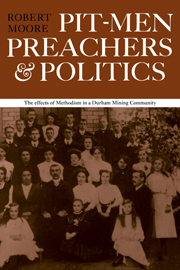Book contents
- Frontmatter
- Contents
- Dedication
- Acknowledgements
- List of abbreviations
- Introduction
- 1 Historical background
- 2 The Deerness Valley
- 3 The social and economic basis of paternalism: the colliery-owners in the Deerness Valley
- 4 Village Methodism – I
- 5 Village Methodism – II: the structure of the Methodist societies in the Deerness Valley
- 6 The respectable Methodists and the old Liberalism
- 7 The radicals and the Labour Movement, 1900–1926
- 8 Methodists in action: three political case studies
- 9 1970 – a postscript
- Conclusions
- Appendix I research strategy and techniques
- Appendix II the Methodist community and objections to Anglican union
- Appendix III the religious statistics
- Appendix IV occupational status, social mobility and the structure of Methodist leadership
- Notes
- Bibliography
- Glossary
- Index
9 - 1970 – a postscript
Published online by Cambridge University Press: 24 November 2009
- Frontmatter
- Contents
- Dedication
- Acknowledgements
- List of abbreviations
- Introduction
- 1 Historical background
- 2 The Deerness Valley
- 3 The social and economic basis of paternalism: the colliery-owners in the Deerness Valley
- 4 Village Methodism – I
- 5 Village Methodism – II: the structure of the Methodist societies in the Deerness Valley
- 6 The respectable Methodists and the old Liberalism
- 7 The radicals and the Labour Movement, 1900–1926
- 8 Methodists in action: three political case studies
- 9 1970 – a postscript
- Conclusions
- Appendix I research strategy and techniques
- Appendix II the Methodist community and objections to Anglican union
- Appendix III the religious statistics
- Appendix IV occupational status, social mobility and the structure of Methodist leadership
- Notes
- Bibliography
- Glossary
- Index
Summary
Methodism in the valley seems no longer to be a force with which men have to reckon. From 1930 onwards the numbers of Methodists declined (for an indication of the size of this decline, see Table 13, Appendix III). A ‘good’ period for Methodism was one in which membership was no more than static. Economic and demographic changes, social and geographical mobility have eroded Methodist members until by 1970 there were only eighty-five households in the four villages that could be called Methodist households. The penumbra of membership was very small.
There are subjective factors which explain why Methodism and the Methodist influence declined. It is possible to detect a vague and scarcely articulated disenchantment with the Methodist record in the First World War. Methodism took an ambiguous stance similar to all other Churches, but the local Methodists actively recruited among the mines and served on tribunals. Then came the disillusionment of the post-war period. Great sacrifices had been called for and made, while the reward for the villagers was continuous hardship and political conflict. Part of the blame for the lack of repayment was therefore directed towards those organisations which had been seen to give active support to the war, like the local Methodist leaders.
The loss of authority by the Methodist leaders after the Strike of 1926 has been discussed. The issues at stake in that dispute were decided at a national level, but the villagers also responded to the attitudes of the local leaders.
- Type
- Chapter
- Information
- Pitmen Preachers and Politics , pp. 214 - 221Publisher: Cambridge University PressPrint publication year: 1974



